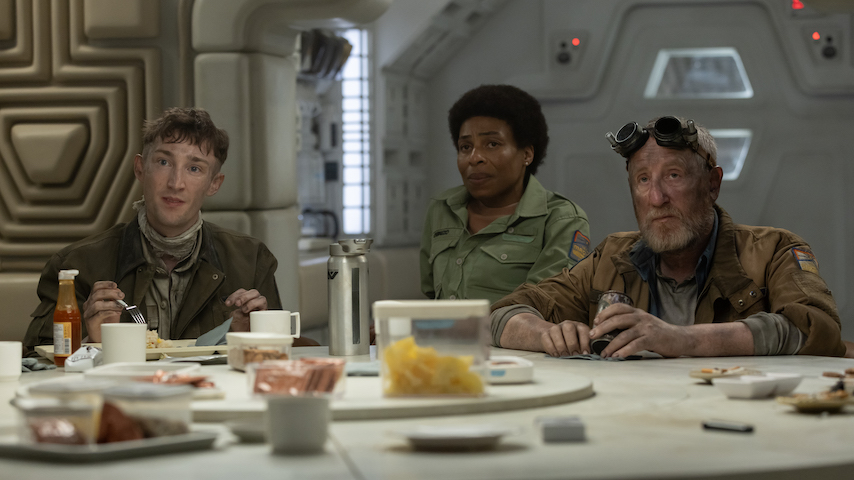Alien: Earth has reached its anticipated flashback episode, “In Space, No One…”, taking viewers back to the initial moments of the series. Writer-director Noah Hawley dives into the last hours of the USCSS Maginot, creating a legacy prequel that cleverly uses the Alien narrative against the audience. Establishing a streamlined version of Alien, Hawley builds on the pilot and deviates from the typical movie formula. The result is less of a rehash and more of a trial run, as the failures of the Maginot inform Yutani’s subsequent plans for the Nostromo.
Before delving into the new episode, it’s important to reflect on the show’s prologue. Schmuel (Michael Smiley) provides crucial details and character insights amidst his civics lesson, enabling viewers to better appreciate the latest episode. Petrovitch’s suspicions of sabotage and Morrow’s observations of Zaverni’s (Richa Moorjani) and Bronski’s (Max Rinehart) flirtations hint at Morrow’s potential power grab aboard the ship. What I initially saw as just an Alien movie outline is instead the beginning of a whodunit in Morrow’s mind. However, Morrow falters as a detective in “In Space,” with the saboteur proving to be less of a concern than the crew’s own ignorance and cynicism.
The episode begins roughly three-and-a-half months after the prologue. Morrow is awakened from cryosleep by Clem (Tom Moya), who informs him of a series of crises: a fire has consumed the fuel and navigation systems, Face Huggers have escaped, the captain has died during surgery, and Bronski is currently facing a Face Hug. Notably, Clem seems more focused on Zaverni and Bronski’s romantic entanglements than the dire situation at hand. This highlights Hawley’s intent—depicting a crew that is immature, distracted, and more concerned about Morrow’s attire than their captain’s wellbeing. The name Maginot references the Maginot Line, representing a false sense of security, reflected in the crew’s actions. Morrow suspects sabotage or incompetence as the origin of their troubles, and the truth is a combination of both.
After several episodes of heavy philosophical discourse, “In Space” injects vigor into the series as we witness this crew’s failures stemming from their own folly. “Another victory for the enemy of reason,” Rahim reflects while overseeing Bronski’s body. “This space bug proves how foolish smart people can be—able to build ships that traverse space yet too stupid to realize they shouldn’t bring back parasites.” Rahim succinctly sums it up: the crew of Maginot is not very bright. Particularly, Malachite (Jamie Bisping) stands out as potentially the dimmest character in the Alien franchise. While his ignorance is grating, it’s Chibuzo’s (Karen Aldridge) carelessness that ultimately seals their fate. Forgetting to secure her bug jar and not following protocols lead to disastrous consequences— highlighting incompetence rather than sabotage.
Hawley plays with the audience’s expectations of an Alien film, utilizing our familiarity against us. Characters that seem to fit the mold of known synthetics, like Mr. Teng (Andy Yu), reveal themselves as mere nuisances rather than primary culprits. Set pieces, including a dinner table chestburster, subvert expectation; the real tension revolves around Malachite ingesting Chibuzo’s drink and infecting himself. His demise nods back to Lambert’s (Veronica Cartwright) iconic death in the 1979 original. However, the episode does more than just trick its audience, as it also gives depth to Morrow’s character. Babou Ceesay skillfully portrays Morrow’s grief and obsession, reflecting the darker facets of his personality. Morrow’s daughter, whom he lost to a house fire during his mission, adds emotional weight to his story.
Unlike his crewmates, Morrow possesses purpose. A sense of nihilism permeates the crew, particularly reflected in Petrovitch’s actions. They are acutely aware of their expendable status. Morrow confronts them with this reality as mobile AI, MU/TH/UR, pushes Zaverni to acknowledge it. Petrovitch, working under dubious intentions for Kavalier, expresses his willingness to sacrifice the ship in exchange for a hybrid body. He shows no regard for humanity, seeking to fulfill a darker plan. Morrow and Petrovitch’s goals converge, though Morrow prefers a different corporate allegiance. The episode concludes with Morrow reaffirming his mission as he stands on Yutani’s balcony, accompanied by Smashing Pumpkins’ “Cherub Rock,” resonating with a sense of resignation and inevitability.
Stray Observations
- • Morrow’s knife stabbing Petrovitch mirrors classic Xenomorph attacks. (Memories linger.)
- • The cast delivered impressive performances, instantly breathing life into their characters, especially Yu, Boutrous, and Aldridge, conveying depth with just a look.
- • It was a pleasure to revisit the production design reminiscent of the original Alien film—I couldn’t help but want to press all the buttons.
- • I find it hard to believe Hawley is overlooking Prometheus and Covenant; the similarities with elements from those films are too apparent.
- • I wish we had more screen time with the cat.
- • The writing makes every glimpse into the crew’s lives intriguing. What were Teng’s intentions? How did those bugs end up on the ship? These questions echo the thrill that made the original Alien so captivating.



